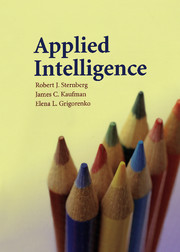Book contents
- Frontmatter
- Contents
- Preface
- 1 Views of Intelligence
- 2 The Theory of Successful Human Intelligence
- 3 Metacognition: Thinking with Metacomponents
- 4 Advanced Problem-Solving Steps
- 5 Cognitive Processing: Performance Components (I)
- 6 Cognitive Processing: Performance Components (II)
- 7 Logical Reasoning and Analysis of Arguments: Performance Components (III)
- 8 Inference and Inferential Fallacies
- 9 Knowledge-Acquisition Components
- 10 Coping with Novelty
- 11 Deciding for Creativity
- 12 Automatizing Information Processing
- 13 Practical Intelligence
- 14 Why Intelligent People Fail (Too Often)
- References
- Author Index
- Subject Index
2 - The Theory of Successful Human Intelligence
Published online by Cambridge University Press: 09 November 2009
- Frontmatter
- Contents
- Preface
- 1 Views of Intelligence
- 2 The Theory of Successful Human Intelligence
- 3 Metacognition: Thinking with Metacomponents
- 4 Advanced Problem-Solving Steps
- 5 Cognitive Processing: Performance Components (I)
- 6 Cognitive Processing: Performance Components (II)
- 7 Logical Reasoning and Analysis of Arguments: Performance Components (III)
- 8 Inference and Inferential Fallacies
- 9 Knowledge-Acquisition Components
- 10 Coping with Novelty
- 11 Deciding for Creativity
- 12 Automatizing Information Processing
- 13 Practical Intelligence
- 14 Why Intelligent People Fail (Too Often)
- References
- Author Index
- Subject Index
Summary
The theory of successful human intelligence presented in this book provides a broader basis for understanding intelligence than do many (and perhaps most) of the theories considered in Chapter 1. The theory consists of three parts (and, therefore, is also called the “triarchic theory”). The first part considers intelligence as what goes on inside of someone – an internal world, so to speak. These “internal” abilities (or “mental mechanisms”) can lead to more intelligent or less intelligent behavior (Sternberg, 1997; Sternberg, 1999b; Sternberg, 2003; Sternberg, 2006). There are three kinds of mental processes that are important in planning what things to do, learning how to do the things, and actually doing them.
The second part of the theory examines a person's experience in handling a task or dealing with a situation. There are certain points in the performance of a task in which a person's intelligence has a critical role. In particular, this part of the theory emphasizes dealing with novelty and how mental processing in intelligence sometimes can be made automatic.
The third part of the theory relates intelligence to the external world of the individual, and specifies three kinds of acts – environmental adaptation, environmental selection, and environmental shaping – that characterize intelligent behavior in the everyday world. This part of the theory emphasizes the role of the environment in determining what constitutes intelligent behavior in a given setting.
The first part of the theory, which specifies the mental mechanisms of intelligent behavior, is universal.
- Type
- Chapter
- Information
- Applied Intelligence , pp. 24 - 47Publisher: Cambridge University PressPrint publication year: 2008



